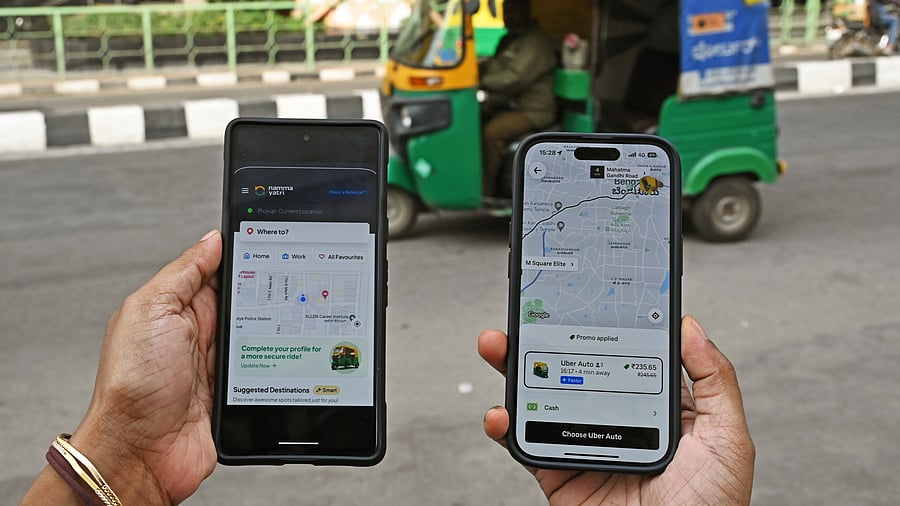
Ride-hailing firms levy peak/surge pricing to account for higher demand, citing a variety of factors such as rush hours, heavy rains, and holidays.
Credit: DH Photo/Pushkar V
Bengaluru: Despite a high court order capping the service charge at 5 per cent for online auto rides, ride-hailing firms continue to charge excessive fares.
In many cases, online auto rides are more expensive than cabs, making commuters question whether regulatory bodies can enforce court rulings.
On May 27, 2024, the High Court of Karnataka ruled that ride-hailing firms cannot collect more than 5 per cent above the stipulated fares for auto rides in Bengaluru, upholding a 2022 notification of the Transport Department. It also restrained the aggregators from imposing surge pricing, stating that any such charges should benefit the permit holder/driver and not the aggregator.
Despite the favourable judgement, the Transport Department has not enforced its 2022 notification. It has instead filed an appeal, seeking a review of certain portions of the judgement passed by Justice Suraj Govindaraj.
"The single bench permitted online ride-hailing firms to offer auto rides under the Karnataka On-Demand Transportation Technology Aggregators Rules, 2016. We have challenged this before the division bench because the rules apply only to four-wheelers. App-based autos need a separate three-wheeler licence," Yogeesh AM, Commissioner for Transport and Road Safety, told DH.
The appeal has been admitted and will soon be heard by a division bench, he added without providing a timeline.
Ride-hailing firms also levy peak/surge pricing to account for higher demand, citing a variety of factors such as rush hours, heavy rains, and holidays. In many cases, online auto rides are 20-30 per cent more expensive than the meter fare, which is Rs 30 for the first 1.9 km and Rs 15 for every subsequent kilometre.
Unlike its competitors, homegrown ride-hailing firm Namma Yatri does not levy any surge pricing. It instead asks riders to "add a tip" for the driver to get faster rides.
Satya Arikutharam, an independent mobility expert, who previously worked with the Department of Urban Land Transport (DULT) as Chief Technical Advisor, argues that the 2016 rules do apply to taxicabs.
"Taxicabs are defined as vehicles that carry up to six passengers. Since autos carry three passengers, they fall within the ambit of these rules," he explained. "The Transport Department's decision to file the appeal is an exercise in futility."
The puzzle of why cab rides are sometimes cheaper than auto rides is because online platforms see all vehicles as "one big pool of supply", according to Arikutharam.
Another reason, he adds, is that Bengaluru has an oversupply of cabs whereas auto-rickshaw numbers are limited according to the permit system.
He believes that the Bengaluru Metropolitan Land Transport Authority (BMLTA), which was set up to integrate and manage the city's urban mobility, can fix the problem if the state government activates it.
Raghu Narayan Gowda, president of the Peace Auto Union, believes cabs are often cheaper than autos at night because there is no night-time surcharge (1.5 times the meter fare), unlike autos.
Gowda advocates for parity between fares to ensure autos are always cheaper than cabs. According to him, the Transport Department should enforce its February 2024 notification that stipulated a uniform fare structure for all cabs based on their purchase price.
Legal tangle
On May 27, 2024, the high court capped the service charge for online auto rides at 5 per cent (plus GST), upholding a 2022 notification of the Transport Department. It also restrained the aggregators from charging surge pricing.
The court ruled that the Karnataka On-Demand Transportation Technology Aggregators Rules, 2016, covered all taxicabs, including autos.
Transport Department has filed an appeal against this, arguing that app-based autos need a separate three-wheeler licence.
Cab rides are sometimes cheaper than auto rides because online platforms see all vehicles as "one big pool of supply". Unlike autos, there is no restriction on cab numbers, resulting in oversupply.